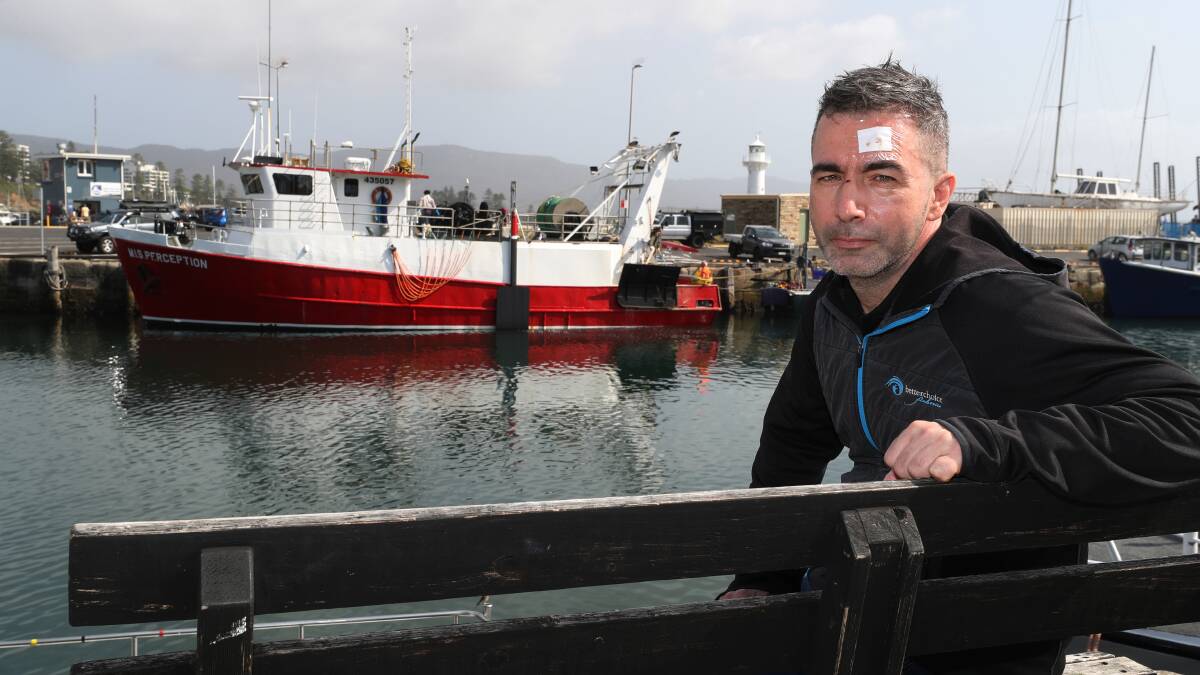
A Wollongong fishing operator says his business will be "wiped out" by the proposed offshore wind farm if it goes ahead within the current footprint.
Subscribe now for unlimited access.
or signup to continue reading
Frank Musumeci and his family have been running commercial fishing operations since the 1940s and are one of the few that continue to operate out of Wollongong Harbour.
Mr Musumeci runs businesses which go from trawlers operating in the ocean to fish processing and distribution, and employs 70 people.
The operator's prime catch is royal red prawns, a MSC-certified sustainable product and Mr Musumeci said he has significantly invested in the business to keep it operating and have local fish available for Illawarra chefs and home cooks.
"You put an enormous amount of effort and finance into building the business, we've got a state-of-the-art vessel, we've got a fishing quota, an MSC-certified product," he said.
"We've done all this and now we're under threat because of the proposed wind farm."
Mr Musumeci said the proposed wind farm zone covers prime fishing ground and the inability to operate his trawler in the proposed zone would mean that half of what he catches will be off limits.
It wouldn't just be Mr Musumeci's business that would be affected, with other fishing operators based in Wollongong joining together to put a joint submission in on the wind farm zone.
"We've found that the area they've proposed is basically wiping out the commercial fishing industry," he said.
Documents published by the federal department overseeing the wind farm proposal state that commercial fishing and offshore wind can co-exist but those with existing fishing rights may be impacted.
"In most cases, commercial and recreational fishing activities may be able to share the space with future offshore wind projects," the documents state. "However, fisheries that use methods such as trawling and longlines will be subject to exclusion around infrastructure, including towers and cables."
A spokesperson for the Department of Climate Change, Energy Environment and Water said it would be up to individual wind farm developers on a project-specific basis to negotiate with commercial fishing operators.
"Construction activities cannot commence without a management plan that has been approved by the Offshore Infrastructure Regulator," the spokesperson said. "The licence holder must demonstrate how the design of the project shares the area with existing marine users, as well as outline how the project will address issues such as the approach to decommissioning, location of individual turbines, any potential environmental impacts and visual impact."
UOW associate professor Michelle Voyer said the project-by-project approach did not always make the most sense for commercial fishing operators.
"There is far too much left to developers to negotiate and respond to," she said.
"A lot of these questions are cumulative, or bigger than one individual development or development. Our sense is that there needs to be more strategic management."
Professor Voyer and colleagues at the Blue Energy Futures Lab made a submission as part of the consultation on the wind farm zone. While the submission was in favour of the proposal overall, it singled out the impact on commercial fishers and the royal red prawn in particular as an area of concern.
"The proposed area also overlaps with almost the entire fishing ground for royal red prawns, a locally important fishery," the researchers from UOW noted.
"Due to the nature of the management regimes under which the fisheries operate, it may not be a feasible option to simply fish somewhere else, and the government needs to consider the flow-on effects to seafood businesses in the Illawarra, if not more widely."
The Professional Fishers Association of NSW has condemned the proposal for wind farms in the Illawarra and the Hunter. With CEO Tricia Beatty saying the proposal is "ludicrous" and will have a "devastating impact".
"Although our industry supports the government's intent to unlock renewable energy jobs, energy security and job security, there is significant concerns and evidence that the offshore windfarms will have a significantly negative impact on the marine environment," Ms Beatty said.
One of the most heavily regulated industries in Australia, Professor Voyer said commercial fishing in the South Coast had suffered through a long period of decline, however it had recently been gaining greater recognition as an important, sustainable food source, as well as a draw card for visitors wanting to experience an authentic taste of the South Coast.
Simply compensating commercial fishers for lost catch would not be a suitable option, Professor Voyer said.
"Fisheries have gone through so many of these fishering adjustment processes and compensatory mechanisms, and time and time again we see that fishers don't want to be bought out of the industry. This is a way of life, they don't want to just take money and go and do something else."
After his family had spent three quarters of a century catching fish off the east coast of Australia, Mr Musumeci said he hoped the wind farm zone could be moved to deeper waters to enable him to continue seeing fresh local fish in the windows of fish shops in the Illawarra.
"At the moment, governments take an approach where they've plonked an area, but that area is just detrimental to so many different categories of people and life," he said.
"In an ideal world, we want to coexist, we want to move forward and progress collectively, but that's really tough at the moment with the original area that they've spoken about."
Our news app has had a makeover, making it faster and giving you access to even more great content. Download The Illawarra Mercury news app in the Apple Store and Google Play.


